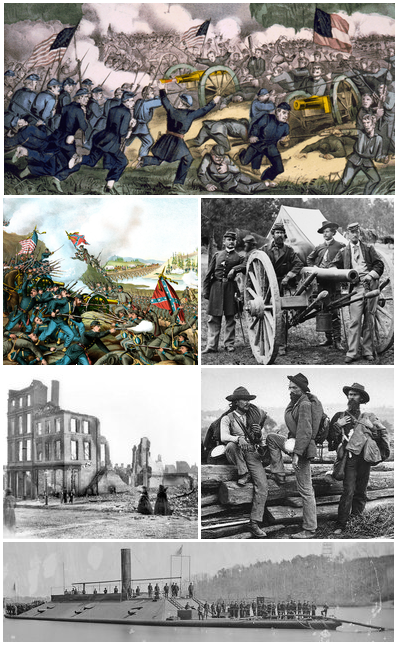The Civil War in the United States began in 1861, after decades of simmering tensions between northern and southern states over slavery, states’ rights and westward expansion. The election of Abraham Lincoln in 1860 caused seven southern states to secede and form the Confederate States of America; four more states soon joined them. The War Between the States, as the Civil War was also known, ended in Confederate surrender in 1865. The conflict was the costliest and deadliest war ever fought on American soil, with some 620,000 of 2.4 million soldiers killed, millions more injured and much of the South left in ruin.

Abraham Lincoln, Gettysburg Address
Delivered on the site of one of the bloodiest battles of the Civil War, the Gettysburg Address is known by some as the greatest speech in the world – and one of Abraham Lincoln‘s defining moments.
Four months earlier, 46,000 soldiers from both sides of the Civil War had been killed or wounded in the Battle of Gettysburg, in Pennsylvania.
The 273 words delivered by Lincoln at the official dedication ceremony for the National Cemetery at the site on November 19, 1863, called upon the fundamental principles of the Declaration of Independence and the Union’s ideals – «a government of the people, by the people, for the people».
The speech’s legacy and lasting impact has seen American schoolchildren throughout the years taught to recite the historical phrasings, while subsequent presidents are also said to have used the speech as a map for governance in the US.

13th and 14th Amendment
Long before the Union victory in 1865, Congress prepared for the many challenges the nation would face at war’s end, particularly the integration of four million newly emancipated African Americans into the political life of the nation, and the readmission to federal representation of former states in rebellion. Congressional Reconstruction included the Thirteenth and Fourteenth amendments to the Constitution which extended civil and legal protections to former enslaved people.
Thirteen Amendment
Although Congress abolished slavery in the District of Columbia in 1862, and President Abraham Lincoln’s Emancipation Proclamation ended the practice of slavery in rebellious states in 1863, at war’s end in 1865 the question of slavery had not been resolved at the national level. The federal government required new state constitutions in former Confederate states to include the abolition of slavery, but there was nothing to prevent states from reinstituting the practice with revised state constitutions. Senators Lyman Trumbull of Illinois, Charles Sumner of Massachusetts, and John Henderson of Missouri, sponsored resolutions for a constitutional amendment to abolish slavery nationwide. The Thirteenth Amendment—passed by the Senate on April 8, 1864; by the House on January 31, 1865; and ratified by the states on December 6, 1865—abolished slavery “within the United States, or any place subject to their jurisdiction.” Congress required former Confederate states to ratify the Thirteenth Amendment as a condition of regaining federal representation.
Fourthteenth Amendment
Ratified July 9, 1868, the Fourteenth Amendment granted citizenship to all persons «born or naturalized in the United States,» including former enslaved persons, and provided all citizens with “equal protection under the laws,” extending the provisions of the Bill of Rights to the states. The amendment authorized the government to punish states that abridged citizens’ right to vote by proportionally reducing their representation in Congress. It banned those who “engaged in insurrection” against the United States from holding any civil, military, or elected office without the approval of two-thirds of the House and Senate. The amendment prohibited former Confederate states from repaying war debts and compensating former slave owners for the emancipation of their enslaved people. Finally, it granted Congress the power to enforce this amendment, a provision that led to the passage of other landmark legislation in the 20th century, including the Civil Rights Act of 1964, and the Voting Rights Act of 1965. Congress required former Confederate states to ratify the Fourteenth Amendment as a condition of regaining federal representation.
Black Codes
The Black Codes were laws passed by Southern states in 1865 and 1866 in the United States after the American Civil War with the intent and the effect of restricting African Americans‘ freedom, and of compelling them to work in a labor economy based on low wages or debt. Black Codes were part of a larger pattern of Southern whites, who were trying to suppress the new freedom of emancipated African-American slaves, the freedmen. Black codes were essentially replacements for slave codes in those states. Before the war in states that prohibited slavery, some Black Codes were also enacted. Northern states such as Ohio, Illinois, Indiana, Michigan, and New York enacted Black Codes to discourage free blacks from residing in those states and denying them equal rights, including the right to vote, the right to public education, and the right to equal treatment under the law. Some of these northern black codes were repealed around the same time that the Civil War ended and slavery was abolished.
:max_bytes(150000):strip_icc()/BlackCodes-5c6aeaf9c9e77c00013b3c06.jpg)